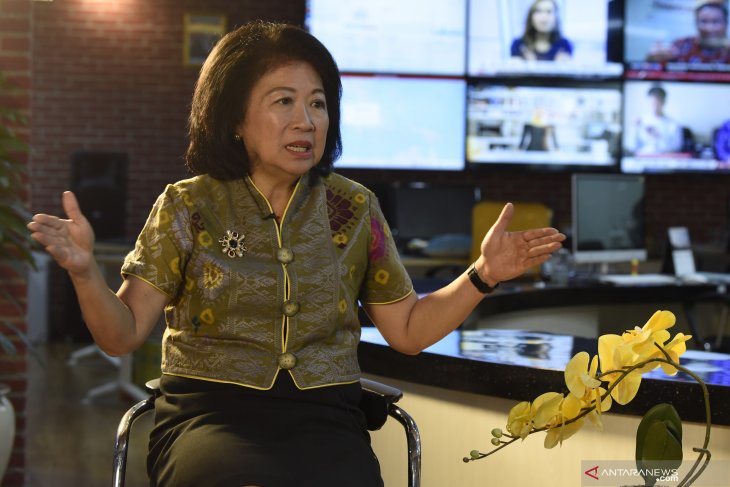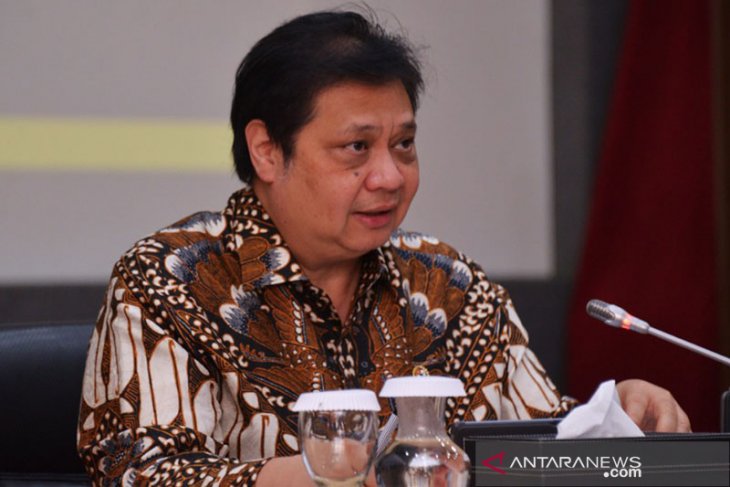Live Streaming
Program Highlight
Company Profile
Economist Foresees Potential Economic Rebound in Indonesia in mid-2021
Written by Ani HasanahIndonesia's economy could recover at the latest by mid-2021 owing to the discovery of the COVID-19 vaccine in early next year, Institute for Development of Economics and Finance's (Indef's) senior economist, Iman Sugema, stated.
"The economic recovery really relies on how immediate the discovery of the COVID-19 vaccine is. If it can be reached on time, Indonesia's economy will rebound in mid-2021," Sugema explained.
Speaking at a discussion organized by Indef in Jakarta on Tuesday (Aug 25), the economist remarked that the discovery of the novel coronavirus vaccine was, therefore, the key to responding to the major impacts of this pandemic.
Availability of the COVID-19 vaccine would offer certainty to businesspersons and the industrial sector to revive production as the demands of consumers also start growing, he noted.
"If the handling of this COVID-19 pandemic gets protracted, more companies will encounter difficulties, and the economic recovery process will also become more challenging," he noted.
However, if the COVID-19 pandemic were to be handled properly, Sugema projects Indonesia's economic growth to likely exceed 5.02 percent recorded in 2019.
Indef had earlier forecast that Indonesia's economic performance in 2021 would really depend on the improvements that it did in 2020.
At the end of 2020, Indef projected Indonesia's economic growth rate to be recorded at between minus 0.53 percent and minus 0.14 percent if the absorption of expenditure from fiscal stimulus were to reach at least 60 percent.
Hence, Indef expressed the belief that Indonesia's economic growth in 2021 could be recorded between 2.54 percent and 3.77 percent or lower than that of the government's forecast at 4.5-5.5 percent.
On Wednesday, Coordinating Minister for Economic Affairs Airlangga Hartarto revealed that Indonesia aims to obtain 30 million doses of the COVID-19 vaccine produced by PT Bio Farma by the end of 2020.
"We are optimistic that by the end of this year, we will have access to 30 million doses of the vaccine produced at Bio Farma. This is the foremost initiative," he stated at an online discussion.
Novel coronavirus infections initially surfaced in the Chinese city of Wuhan at the end of 2019.
Since then, COVID-19 has spread to over 215 countries and territories, including 34 provinces of Indonesia, with a massive spurt in the death toll.
To tackle this COVID-19 pandemic, Indonesia is leaving no stone unturned to develop a vaccine to fight the virus.
Currently, in addition to the Sinovac COVID-19 vaccine, Indonesian scientists are working on a vaccine named after the country's national flag, Merah Putih (Red and White). (ANTARA)
August
WB: Data Synchronization Critical for Indonesia's Social Aid Program
Written by Ani Hasanah
Managing director of development policy and partnerships at the World Bank, Mari Elka Pangestu. (ANTARA/Saptono/wpa/aww)
The Indonesian government needs to carry out data synchronization to accelerate the distribution of social assistance among the people, said managing director of development policy and partnerships at the World Bank, Mari Elka Pangestu.
"Our recommendation is for Indonesia to have trusted and inter-operated data with payment system," Pangestu said at an online discussion in Jakarta on Wednesday.
She said countries that carry out data synchronization can distribute social assistance quickly and according to target, which, in turn, can ease the burden on the people amid the COVID-19 pandemic.
"The lesson learned in distributing social assistance is the importance of data and digital presence of ID that links to the funding system. Indonesia already has a high covered ID system, but the problem is on the data," she pointed out.
Pangestu said speeding up the distribution of social assistance, such as cash aid, is very much needed as empirically, it is the best way to reach all people impacted by COVID-19.
"Most countries are using cash aid instruments — that is empirically the best and most direct way to reach the people and keep those who have lost their income safe," she added.
Furthermore, she stressed on technology development and data improvement, not only at the government level but at the smallest level, such as neighborhood administrations.
She said she believed that such methods can sustain the acceleration of social assistance distribution, as well as other policies that need to hit the target.
"Without data, we need to be creative and innovative in using existing data that can be expanded as a data system that can be used," she averred. (ANTARA)
August
Government Adjusts Budget for Health Sector to Rp72.73 Trillion
Written by Ani Hasanah
Coordinating Minister for Economic Affairs Airlangga Hartarto. (ANTARA/HO-Kementerian Perekonomian/pri)
The Indonesian government has adjusted the budget for the health sector to Rp72.73 trillion as part of the economic recovery program in the wake of the COVID-19 pandemic, Coordinating Minister for Economic Affairs, Airlangga Hartarto, said.
“We have monitored the realization of the budget for the economic recovery and of course, we hope it can be used optimally for economic recovery through the adjustment to the additional budget from Rp87.5 trillion to Rp72.73 trillion,” he said following a meeting of the Committee for COVID-19 Handling and National Economic Recovery in Jakarta on Wednesday.
The government has also made adjustments to its budget for social protection programs. It is mulling a plan to initiate new programs by taking advantage of the adjusted budget funds, the minister said.
"There have been shifts. We will continue to monitor them and propose new programs," he remarked.
He said the meeting also discussed the revision of the presidential regulation on the procurement of COVID-19 vaccines. "So (the revision of) the presidential regulation on the procurement of vaccines has been decided and we will soon submit it to Mr. President," he informed.
Earlier, the finance minister's expert staff for state spending, Kunta Wibawa Dasa Nugraha, had said the realization of budget funds in the health sector within the framework of economic recovery in the wake of the COVID-19 pandemic had reached 5.12 percent of the total budget amounting to Rp87.55 trillion, as of June 24, 2020.
The increase in the realization of the budget was the result of efforts made by the Finance Ministry and the Health Ministry to expedite the realization, he stated. (ANTARA)
Russia Submits Proposal on Covid-19 Handling Cooperation to Indonesia
Written by Ani HasanahJakarta (VOI News) - Russian Ambassador to Indonesia, Lyudmila G. Vorobyova in Jakarta on Wednesday (26/8) expressed Russia's readiness to cooperate with Indonesia in a bid to overcome Covid-19. She explained that the Russian Direct Investment Fund has stated its readiness to cooperate with Indonesia in three directions. Ambassador Lyudmila said that firstly Russia is ready to cooperate in the distribution of the Covid-19 vaccine if Russia has completed a clinical trial phase. Even Russia is also ready to provide a clinical trial facility for the vaccine in Indonesia. Moreover, she further said that Russia is also ready to produce some of the vaccine components needed domestically. She also remarked that the cooperation proposal has been submitted to the Indonesian government and Russia hopes to get a response sooner.
"Russian direct investment fund is ready to cooperate with Indonesia basically in three directions. First of all, is the sale and distribution of the vaccine when all the clinical trials are completed. We are also ready to have clinical trials in Indonesia. Of course, it will facilitate the registration of the vaccine in the country. And we are also ready to manufacture at least some of the components of the vaccine in Indonesia. So these are the proposals of the Russian direct investment fund and hopefully we will have the response from our Indonesian friends,” said Ambassador Lyudmila.
Previously, Spokesperson of Russian Foreign Minister, Maria Zakharova in a press statement stated that the Coronavirus has brought about a negative impact on economic growth globally. This virus is also believed to have affected the daily lives of people. She also stated that the only way to effectively fight against this global challenge is through joint efforts of all international communities. (Ndy/Trans by AF)




